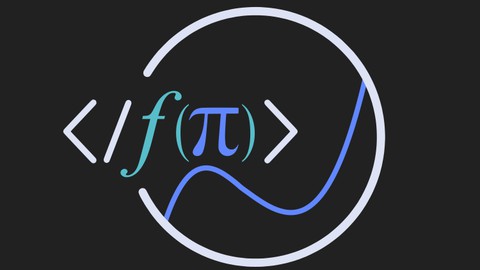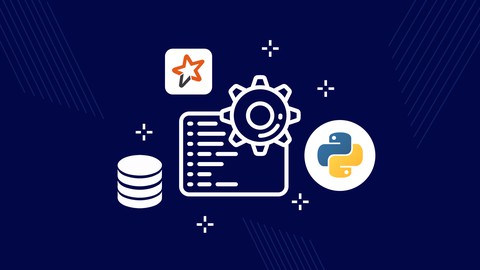Master calculus 1 using Python: derivatives and applications
Loại khoá học: Math
Develop a deep understanding and intuition for calculus. Solve problems and implement algorithms by hand and in Python.
Mô tả
The beauty and importance of calculus
Calculus is a beautiful topic in mathematics. No, really!
At its heart, calculus is about change. Life is full of change, and calculus is the language that humans developed (invented or discovered -- that's an ongoing debate!) to understand how physical, biological, and abstract systems change. Calculus is more than just some equations you have to memorize; it's a way of looking at the world and trying to understand how the tiniest infinitesimal changes can lead to gigantic complexity bigger than the imagination.
OK, but aside from all that fluff, calculus is also really important for basically every piece of engineering and digital technology that has touched humanity. Indeed, the history of calculus is the history of civilization.
You want to learn data science? => You need calculus.
You want to learn machine-learning? => You need calculus.
You want to learn deep learning? => You need calculus.
You want to learn computational science? => You need calculus.
You want to learn... I think you see the pattern here ;)
Why learn calculus?
There are three reasons to learn calculus.
It has applications for understanding data science and machine-learning algorithms, but it's also a beautiful topic in its own right.
Learning math will train your critical thinking and reasoning skills. Any branch of mathematics will train your brain, but calculus especially so, because doing calculus is a lot of like running scientific experiments -- generate hypotheses, test them in experiments by holding variables constant, and measuring the output.
It's a better hobby than sitting around watching netflix. Seriously. Learning math will help protect you from age-related cognitive decline. Challenge your mind to keep it sharp!
Learn calculus the traditional way or the modern way?
So, how do you learn calculus? You can learn it the way most people do -- by watching someone else scratch on a chalkboard while you furiously take notes and try to decipher their sloppy handwriting, all the while having a little voice in your head telling you that you don't get it because you're not smart enough.
Or you can try a different approach.
I follow the maxim "you can learn a lot of math with a bit of coding." In this course, you will use Python (mostly the numpy and sympy libraries) as a novel tool to help you learn concepts, proofs, visualizations, and algorithms in calculus.
There are three reasons to use Python to learn calculus:
Practical applications: Calculus is essential for understanding data science, machine learning, deep learning, computational science, and many other fields.
Mental exercise: Learning calculus, particularly in combination with Python, will train your critical thinking and reasoning skills.
Lifelong benefits: Engaging your mind with calculus can help protect against age-related cognitive decline and offer a fulfilling alternative to passive leisure activities.
So this is just about coding math?
No, this course is not about coding math. And it's not about using Python to cheat on your math homework. Python's symbolic math and plotting engines are incredibly powerful -- and yet underutilized -- tools to help you learn math. By translating formulas into code, implementing algorithms, and solving challenging coding exercises, you will gain a deep knowledge of concepts in calculus.
And the graphics engine in Python will let you see equations and functions in a way that helps you develop intuition for why functions behave the way they do.
You will also learn the limits of computers for learning calculus, and why you still need to use your brain and freshly developed calculus skills.
New to Python?
Python is a versatile and user-friendly programming language that complements calculus, especially when using libraries like NumPy and SymPy. By incorporating Python into your calculus studies, you can gain a deeper understanding of mathematical concepts, proofs, visualizations, and algorithms.
If you are new to Python, then don't worry! This course comes with a 7+ hour Python coding tutorial (potentially up to 12 hours if you complete all the exercises) that is designed for beginners and will teach you the coding skills you'll need for this course.
Are there exercises?
Everyone knows that you need to solve math problems to learn math. This course has exercises for you to solve in nearly every video -- and I explain the answers to every single exercise (not only the odd-numbered ones, lol).
But wait, there's more! I don't just give you problems to work on; I will teach you how to create your own exercises (and solutions) so you can custom-tailor your own homework assignments to practice exactly the skills you most need to work on. Because you know, "give someone a fish" versus "teach someone to fish."
Is this the right course for you?
One thing I've learned from 20+ years of teaching is that no two learners are the same, which means that no course will be right for everyone. I hope you find this course a valuable learning resource -- and fun to work through! -- but the reality is that this course won't be ideal for everyone. Please watch the preview videos and check out the reviews before enrolling.
And if you enroll but then decide that this course isn't a good match for you, then that's fine! Check out Udemy's 30-day return guarantee.
Bạn sẽ học được gì
Yêu cầu
Nội dung khoá học
Viết Bình Luận
Khoá học liên quan

Đăng ký get khoá học Udemy - Unica - Gitiho giá chỉ 50k!
Get khoá học giá rẻ ngay trước khi bị fix.









![[NEW] Spring Security 6 Zero to Master along with JWT,OAUTH2](/uploads/courses/udemy/3485044_ef54_2.jpg)








Đánh giá của học viên
Bình luận khách hàng